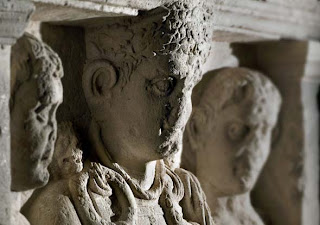hav·er·sack (noun): a single-strapped bag worn over one shoulder and used for carrying supplies; a bag for rations, extra clothing; a bag used by workers or travellers to carry havercake (oat-bread) in 19th-century England. From the French Havresac and German Habersack (18th century)
Tuesday 29 November 2011
Review: The Old Swan and Minster Mill, Oxfordshire
Spring should see the meadows adjacent to the Old Swan and Minster Mill, in Oxfordshire, filled with wildflowers, says the hotel’s owner, Peter de Savary.
‘We’ve sown 60 acres with them,’ says the serial entrepreneur, ‘that should attract millions of butterflies. The watermeadows will be a fabulous place for people to have a picnic lunch.’
The 67-year-old hotelier is talking to me over afternoon tea in the drawing room of the Old Swan and Minster Mill, latest venture of de Savary and his wife, Lana.
The hotel, situated in the attractive village of Minster Lovell in the Oxfordshire Cotswolds, was bought by the de Savarys in 2010 and has since been extensively refurbished.
Labels:
hotels,
Minster Mill,
Old Swan,
Oxfordshire,
Peter de Savary,
reviews
Saturday 19 November 2011
Review: All the Devils Are Here
It perhaps comes as no surprise to learn that Lehman Brothers’ CEO Dick Fuld was, and quite possibly is, a man who only heard what he wanted to hear.
On Wednesday September 10 2008 Fuld had to face up to one large reality, though – that the bank he headed had released third-quarter results for the year that involved a loss of $3.9 billion.
The rest, as they say, is history; the collapse of Lehman, the departure of Fuld, and a prolonged banking crisis.
The focus of Bethany McLean’s and Joe Nocera’s book All the Devils Are Here is how the seeds were sown for this crisis decades earlier, as the US financial system allowed huge bets to be wagered on the sub-prime mortgage market.
Labels:
All the Devils Are Here,
bankers,
banks,
books,
credit crunch,
financial crisis,
Lehman Bros,
reviews
Friday 18 November 2011
Xanten: heart of Roman Germania
For someone who died 2,000 years ago, we know rather a lot about Marcus Caelius.
He was born in Bologna in 44BC and rose through the ranks of the Roman army to the rank of senior centurion in the 18th Legion.
In 9AD he was based at Castra Vetera, near the modern-day German town of Xanten – which is around 12 miles from the airport of Weeze/Niederrhein and near the border with Holland.
Castra Vetera was a extensive military and administrative base, close to the river Rhine, and second only to Cologne in importance for the Roman Empire in the region.
Labels:
archeology,
Germany,
history,
museums,
Rome,
Teutoburg forest,
Varus,
Xanten
Thursday 17 November 2011
The konik horses of Wicken Fen
A horse is eating my trousers. It sounds like something from a school French phrasebook of the 1950s, but it’s true. I wouldn’t mind, but I’m still wearing them.
The animal in question is one of 44 dusty-grey coloured konik ponies living at the Wicken Fen nature reserve in Cambridgeshire.
The word konik means ‘little horse’ in Polish and the breed is one of the most ancient in the world – genetically close to the herds that would have roamed Europe 4,000 years ago.
The animals are inquisitive, using their noses, lips – and teeth – to find out more about anything new – and that includes strange people who happen to wander into their vicinity.
Labels:
Cambridge,
Eco-tourism,
Environment,
Green,
Horses,
National Trust,
Nature,
Wicken Fen,
Wildlife
Tuesday 15 November 2011
Welsh film provides weak Resistance
It's always going to be tricky to cut down a 300-page novel into a one-and-a-half hour film, so I might have watched Resistance with overly high hopes.
Owen Sheers' story is based around the assumption that D-Day has failed and that by October 1944 the German army has invaded the UK and forced its way into southern and western England.
In a remote valley in rural Herefordshire (and should that be Monmouthshire?) 26-year-old Sarah Lewis wakes up one morning to discover her husband and all the men from her village have vanished. The women they have left behind do not know where they have gone, but the assumption is they have taken to the hills to join the resistance movement.
Labels:
Andrea Riseborough,
film,
Iwan Rheon,
Michael Sheen,
Resistance,
Wales,
World War II
Subscribe to:
Posts (Atom)




